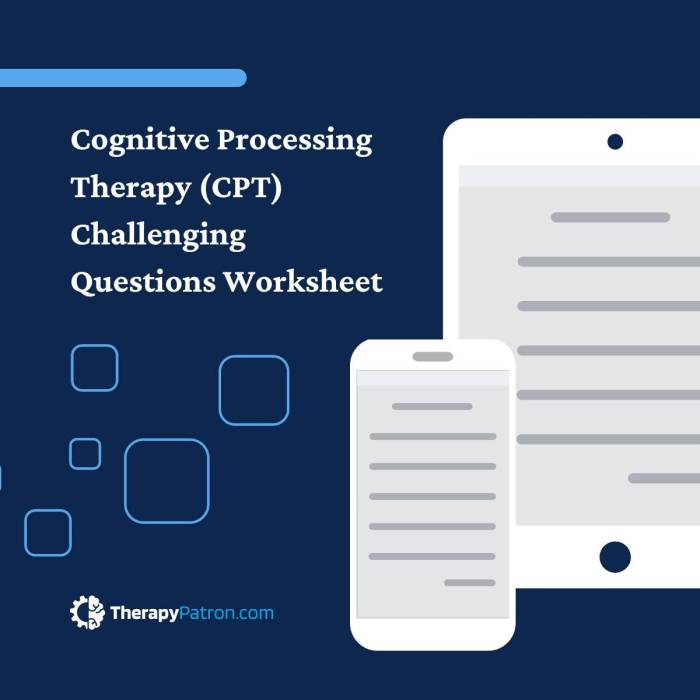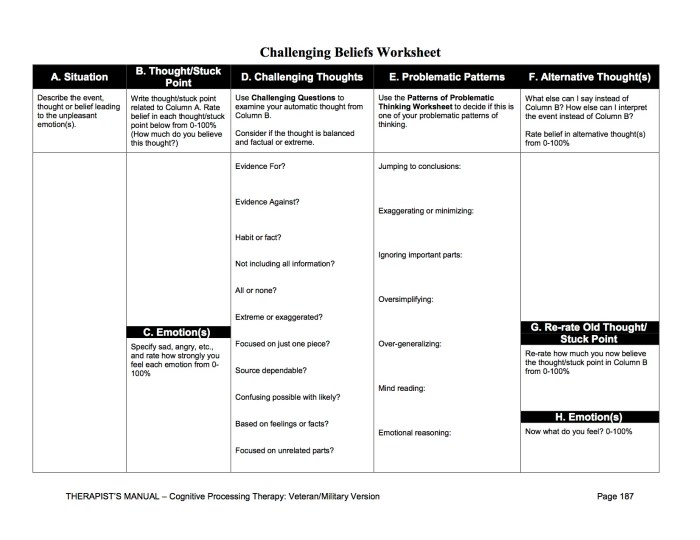Challenging questions worksheet cognitive processing therapy – Challenging Questions Worksheet in Cognitive Processing Therapy (CPT) is a powerful tool that empowers individuals to identify and challenge maladaptive thoughts, fostering cognitive flexibility and emotional well-being. This guide delves into the purpose, types, implementation, and ethical considerations of challenging questions worksheets, providing a comprehensive understanding of their therapeutic value.
Challenging Questions Worksheet in Cognitive Processing Therapy: Challenging Questions Worksheet Cognitive Processing Therapy

Challenging questions worksheets are an integral part of cognitive processing therapy (CPT), a form of therapy designed to help individuals identify and challenge maladaptive thoughts that contribute to psychological distress. These worksheets provide a structured approach for clients to engage in cognitive restructuring, a key component of CPT.
Types of Challenging Questions
- Socratic questioning:Questions that guide clients to explore the logic and assumptions underlying their thoughts.
- Evidence-based questioning:Questions that prompt clients to examine the evidence for and against their thoughts.
- Hypothesis testing:Questions that encourage clients to generate alternative explanations for their thoughts and behaviors.
Implementing Challenging Questions Worksheets
- Identify maladaptive thoughts: Guide clients to identify their automatic negative thoughts.
- Ask challenging questions: Use worksheets to guide clients in asking questions that challenge the validity of their maladaptive thoughts.
- Generate alternative thoughts: Encourage clients to develop more adaptive and realistic thoughts.
Sample Challenging Questions Worksheet
| Maladaptive Thought | Challenging Question | Alternative Thought |
|---|---|---|
| “I’m a failure.” | What evidence supports this thought? | “I have made mistakes, but that doesn’t define me as a failure.” |
| “Nobody likes me.” | Are there specific people who don’t like you? | “Some people may not like me, but there are also people who care about me.” |
Using Challenging Questions Worksheets with Specific Populations, Challenging questions worksheet cognitive processing therapy
Adaptations may be necessary when using challenging questions worksheets with specific populations, such as:
- Trauma survivors:Focus on safety and self-compassion.
- Individuals with anxiety disorders:Use questions that address catastrophic thinking.
- Children and adolescents:Use age-appropriate language and examples.
Ethical Considerations
Ethical considerations include:
- Client consent:Obtain informed consent before using challenging questions worksheets.
- Confidentiality:Maintain the confidentiality of client responses.
- Avoiding harm:Ensure that the use of challenging questions does not exacerbate psychological distress.
Query Resolution
What is the purpose of challenging questions worksheets in CPT?
Challenging questions worksheets in CPT help individuals identify and challenge maladaptive thoughts that contribute to psychological distress.
How can challenging questions help individuals identify and challenge maladaptive thoughts?
Challenging questions encourage individuals to examine the evidence supporting their thoughts, consider alternative perspectives, and develop more balanced and realistic beliefs.
What are some common types of challenging questions used in CPT?
Common types of challenging questions include Socratic questioning, evidence-based questioning, and hypothesis testing.


